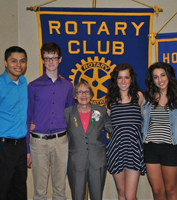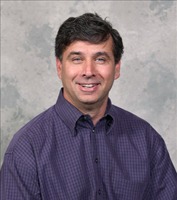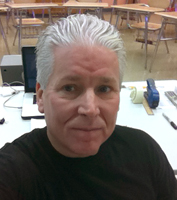May 14, 2013
AMHERST, Mass. — Three secondary school instructors who challenged, inspired and moved members of Amherst College’s Class of 2013 will be honored with the Phebe and Zephaniah Swift Moore Teaching Awards during the school’s 192nd Commencement exercises at 10 a.m. on Sunday, May 26. This year’s recipients are Deborah Hepburn, an English teacher at Clinton Senior High School in Clinton, N.Y.; Larry Klein, a history and social studies teacher at Harvard-Westlake School in Studio City, Calif.; and Fred Murphy, a history teacher at Frederick Douglass Academy in New York, N.Y.
The honor recognizes instructors and counselors who have been important in the lives of graduating Amherst students. The winners were chosen by a committee of seniors, faculty and staff from nominations submitted by members of the Class of 2013.
|
Image

Deorah Hepburn, center |
Nominator Anna Hagstrom wrote that, even before she ever met Hepburn, she heard joyful noises emanating from her classroom: the teacher—beloved for generations at her small public high school in Upstate New York—would blow a conch shell, bang a gong and sing showtunes to celebrate and encourage her students. Hepburn’s Grade 11 Honors English class introduced Hagstrom to many of her favorite novels and plays, and her Grade 12 Advanced Placement English Language course, with a focus on genocides around the world, often moved Hagstrom to tears as she learned about the “darkness of man’s heart” and the “true strength of the human spirit.” Through personal journal assignments and a 37-page research paper on the Democratic Republic of Congo, Hagstrom was able to hone reading and writing skills that have wowed her professors at Amherst. “In an age where public education in New York is growing increasingly standardized and regimented,” Hagstrom wrote in her nomination, “Deborah Hepburn stands as a reminder that the best teachers … are those who cultivate their students as individuals, as human beings with knowledge of the world’s great beauty and terrifying atrocities and a restless desire to amplify the beautiful and change the terrible. The best teachers teach their students to care.”
|
Image

Larry Klein |
Maddy Sprung-Keyser considers Klein her “single-most-important-never-forget-for-the-rest-of-your-life-teacher.” His “coveted,” close-knit AP U.S. Government class is the reason she became passionate about politics and history; majored in law, jurisprudence and social thought at Amherst; and plans to go on to law school. In Klein’s classroom, she wrote, “[c]urrent events were our textbook.” His students read Supreme Court opinions, blogged about the daily news, consulted NPR and other sources and watched C-SPAN to witness bills being proposed and passed. During the 2008 Presidential race, the teacher “brought the election to us,” having students debate the positions of candidates Barack Obama and John McCain and inviting guest speakers from the campaigns. Some students were inspired to join political advocacy groups. Sprung-Keyser admired Klein for being both honest about his own political views and a skilled “devil’s advocate” of opposing views. She noted that his friendly involvement with the school community extended far beyond his own classroom: “As an assistant basketball coach and advisor to the student government and honor board Mr. Klein interacted with and influenced the broadest cross-section of students at Harvard-Westlake.”
|
Image

Fred Murphy |
Lorena Rodriguez wrote that Murphy’s approach to teaching, “which emphasizes the ‘big picture’ of major historical events and forces us to point out historical trends, made me realize that history is more than mere memorization of dates and facts.” Murphy had worked in the construction industry between teaching jobs; his father Fritz Murphy taught Advanced Placement American and European History for 30 years and then was an instructor in Attica State Prison. Murphy joined the faculty of Frederick Douglass Academy, a public school in a working-class New York City neighborhood after 15 years teaching in Catholic Schools in Harlem and the South Bronx. “Mr. Murphy was committed to having his students perform at the level of our more affluent counterparts,” Rodriguez noted, “because he knew we were capable of doing the work if teachers raised their standards.” Indeed, his AP European History class achieved a 100 percent passing rate Lorena’s sophomore year. He kept his classroom open early every morning and late every evening to help students prepare for exams and write college application essays. He arranged for his sister, a University of Pennsylvania graduate, to take students on a tour of the Ivy League campus and to advise them on the college admissions process. As a result, Rodriguez and several of her classmates made it into top colleges and universities. Murphy has been involved with REACH, an organization that offers AP courses to inner-city students, and has helped to create an online Spanish-language video series called College Admissions 411. This year represents his 29th as a classroom teacher in Harlem and the South Bronx. (Murphy’s mentor, Edmund Flood, who had a 44-year teaching career at Rice High School in Harlem, is accompanying Murphy to Amherst’s Commencement this year.)
The Phebe and Zephaniah Swift Moore Teaching Awards are named for the first president of Amherst and his wife. This is the 17th year that the college has presented the awards.
Founded in 1821, Amherst is a highly selective, coeducational liberal arts college with nearly 1,700 students from most of the 50 states and more than 30 other countries. Considered one of the nation’s best educational institutions, Amherst awards the B.A. degree in 36 fields of study.
###